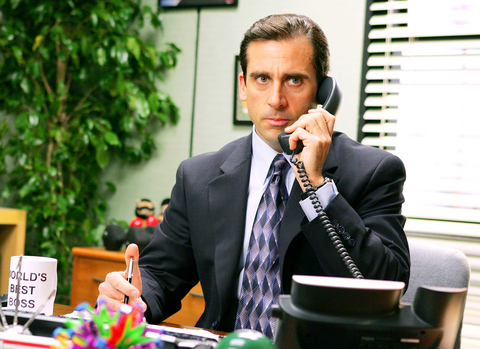If a song is popular now, don't expect to hear it on the US version of The Office until late next year.
The NBC network comedy, which follows the employees of a paper supply company in Scranton, Pennsylvania, avoids the template most series use for their soundtracks. Currently the common approach is to tap an obscure band's material. The teenage soap opera The OC mastered this formula, and it is employed on everything from Grey's Anatomy to Scrubs. These series positioned themselves as arbiters of musical taste by spawning companion albums laden with underground acts like the Shins and Lady Sovereign.
But on The Office, which is based on the UK series of the same name, the music can't be mistaken for cutting edge. Take last month's Christmas episode: When his girlfriend leaves him, the office manager, Michael Scott (Steve Carell), salves his heartache with iTunes samples of James Blunt, who had a No. 1 pop single in the spring. Later Michael rebounds by seducing a new flame with a karaoke version of Your Body Is a Wonderland. That tender ballad was a smash for John Mayer, and it peaked in 2003.

PHOTO: AP
Adding to the musical squareness, other characters belt karaoke versions of Styx's Lady and Pat Benatar's We Belong, two bombastic power ballads.
Asked why The Office uses such dated tunes, Greg Daniels, an executive producer, said: "Our songs are not about the show's identity as a whole. Each song reflects personal elements of a character, or the emotions of the character at the time."
A song is almost required to reflect a specific character before it can appear in an episode. The show's central conceit — that it is a documentary being taped by an unseen film crew — means it uses no underscoring or music montages. Songs must come from everyday sources like radios and computers. For a new song to be heard, a character would need a reason to play it.
And few denizens of The Office, mostly middle-aged, white-collar workers, are likely to know the hottest underground bands. Daniels, 43, said: "Sometimes I turn down suggestions of hipper artists because I don't know who they are. If the song is too obscure, people in the audience won't know what you're trying to say by using it."
But even casual radio listeners will probably know My Humps, which was an inescapable hit for the Black Eyed Peas in 2005. When that song was heard as Michael's cell phone ringtone in an episode late last year, it instantly communicated two things about him: He was trying to emulate the younger generation, and he was lagging about a year behind their tastes.
Jennifer Celotta, a co-executive producer of The Office, said: "It seems like a more intimate relationship exists between characters and the audience because we know what we hear is what they're choosing. If it feels like a show's staff has chosen the songs to make some kind of statement, it puts a distance between you and the experience."
In some cases musicians have been affected by their connection to the series. On his blog (johnmayer.com/blog), Mayer wrote about the use of Your Body Is a Wonderland: "One of my favorite shows on television, The Office, wanted to use my song, but it's safe to say I don't get asked to use Wonderland for strongman competitions. I get asked so that people can goof on it. I initially turned the request down, but after hearing the details on the incredibly funny sounding scene, I decided to go for it."

May 26 to June 1 When the Qing Dynasty first took control over many parts of Taiwan in 1684, it roughly continued the Kingdom of Tungning’s administrative borders (see below), setting up one prefecture and three counties. The actual area of control covered today’s Chiayi, Tainan and Kaohsiung. The administrative center was in Taiwan Prefecture, in today’s Tainan. But as Han settlement expanded and due to rebellions and other international incidents, the administrative units became more complex. By the time Taiwan became a province of the Qing in 1887, there were three prefectures, eleven counties, three subprefectures and one directly-administered prefecture, with

It’s an enormous dome of colorful glass, something between the Sistine Chapel and a Marc Chagall fresco. And yet, it’s just a subway station. Formosa Boulevard is the heart of Kaohsiung’s mass transit system. In metro terms, it’s modest: the only transfer station in a network with just two lines. But it’s a landmark nonetheless: a civic space that serves as much more than a point of transit. On a hot Sunday, the corridors and vast halls are filled with a market selling everything from second-hand clothes to toys and house decorations. It’s just one of the many events the station hosts,

Among Thailand’s Chinese Nationalist Party (KMT) villages, a certain rivalry exists between Arunothai, the largest of these villages, and Mae Salong, which is currently the most prosperous. Historically, the rivalry stems from a split in KMT military factions in the early 1960s, which divided command and opium territories after Chiang Kai-shek (蔣介石) cut off open support in 1961 due to international pressure (see part two, “The KMT opium lords of the Golden Triangle,” on May 20). But today this rivalry manifests as a different kind of split, with Arunothai leading a pro-China faction and Mae Salong staunchly aligned to Taiwan.

Two moves show Taichung Mayor Lu Shiow-yen (盧秀燕) is gunning for Chinese Nationalist Party (KMT) party chair and the 2028 presidential election. Technically, these are not yet “officially” official, but by the rules of Taiwan politics, she is now on the dance floor. Earlier this month Lu confirmed in an interview in Japan’s Nikkei that she was considering running for KMT chair. This is not new news, but according to reports from her camp she previously was still considering the case for and against running. By choosing a respected, international news outlet, she declared it to the world. While the outside world